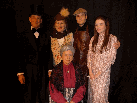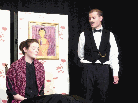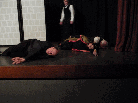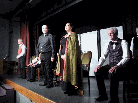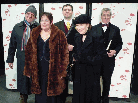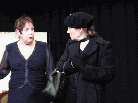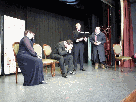|
Three One-Act Plays - directed by Michael Lewis and Tricia Childs
Critic's Comments:-
"Chekhov very much the man of the moment - we celebrated his 150th birthday just the other week.
And it was his "Celebration", a Joke in One Act, which was top of the bill in this pick'n'mix programme.
Successful banker Shipuchin [Neil Smith] is a stickler for style, but his world crashes round his ears, thanks to the interventions of his clerk - Andy Millward, holding our attention with his grumpy misogyny - and two women, his larger than life windbag wife [ a nice character study by Joan Lanario ] and a hilariously determined Irish suppliant [Faye Armstrong]. Michael Lewis's production convincingly charted Shipuchin's descent into weary, nervous collapse.
Hamlet's famous question is referenced in the Chekhov. We were up to speed with it, since we'd just seen Stoppard's brilliantly filleted Shakespeare, in which Millward played a surly Dane, supported by a hard-working cast including Leila Francis as both Gertrude and Ophelia, Reg Peters as a tragic Laertes, and Chris Wright as practically everyone else. No attempt at the world record here, with a deliberate pace marked by the slow change of scene, and a surreal trumpeter playing random hits from the repertoire. I liked the chairs for the encore, though here, I think, a manic pace is de rigueur.
The great Russian master of the 19th Century. The greatest dramatist ever, through the eyes of one of the 20th century finest dramatist. And Jim Sperinck. His Cobblers' Ball was a lame look at the melodrama, only partly redeemed by Rob Francis's laconic simpleton and Angela Gee's man-eating aristocrat."
Michael Gray-Weekly News
---------------------
"This triple bill of one Act plays started well with The Cobbler's Ball, a melodrama complete with exaggerated gestures, a sneering villainess and a Leonard Sachs-style Chairman (Reg Peters). This was a good debut by Jo Peplow-Revell as the hapless Vanilla and Rob Francis's Ronald, the innocent simpleton, was very funny indeed. Elizabeth Myddleton-Evans made the most of her role as Mother and Angie Gee as Lady Jasmin was an excellent female cad. The set was simple but effective, the audience participation was strong and the twist at the end turned what was an otherwise run of the mill melodrama into something a little more interesting.
The Fifteen Minute Hamlet did not live up to my expectation. Although the set was very clever in its construction the requirement to change it slowed down what should probably have been a much slicker play. This lack of pace was compounded by the trumpet solos in between scenes. No doubt these were inserted to add some gravitas to the play but they simply slowed down the action. (this was not the fault of the trumpeter, let me stress). The production was also hampered by some poor enunciation in some parts and by the time I had worked out what was probably said I had missed some vital progression of the plot. It may have been slowness on my part but when actors double up on characters it is perhaps helpful to make the differences between their roles more obvious. The use of modern dress I have no objection to but the lack of differentiation between characters was a problem for me. How to act without physical props is an interesting debate. The absence of props, such as lanterns or swords, I understand but acting or miming their replacements needs very careful handling if the result isn't to look a bit, dare I say, amateurish. Enough said.
The Celebration, by Chekhov, was the complete opposite to the previous play. It was costumed, it was slick, there was purposeful movement and good use of the stage. Each character was finely drawn and well played, with good facial expressions, body language and lively interplay between the actors. Andy Millward was the misogynistic misery-guts to a T and Neil Smith's Andreyevitch was smooth, self-satisfied and slick. Joan Lanario's Tatiana was wonderfully lively and amusing while Faye Armstrong's Nastasia brought a down to earth doggedness to the production and whose dialogue provided the exasperation needed to trigger the explosive and exhausting finale. The best was definitely saved until last in this triple bill."
Stewart Adkins-National Operatic and Dramatic Association
Return to top
|
|


